Ending speculation since the announcement on Friday, U.S. Congressman Earl Blumenauer was in Portland this morning (sans bowtie) to deliver some “straight talk” about energy policy and unveil a bill that will help cure America’s ailing transportation policies.
Expensive oil and gas prices, he said, “has exposed the vulnerabilities of American families to what President Bush famously said was an addiction to oil.”
Standing next to a chart that showed American households living near public transportation services save over $6,000 per year (over those who don’t), Blumenauer introduced his Transportation and Housing Options for Gas Price Relief Act of 2008 (download summary of bill — PDF).
“This is about choices for people, not trapping them in the policies of the past.”
–Rep. Earl Blumenauer
The bill includes a host of provisions that Blumenauer says will give more choices to Americans and that will, “level the playing field to those who don’t want to be auto-dependent.”
Throughout the press conference, Blumenauer made it clear that his legislation will do something to provide relief now, rather than later. “There’s a lot of political oxygen being spent on things that won’t have an impact until 30-40 years from now… More drilling is not a solution.”
Blumenauer said Portland is the inspiration for some of the proposals in the bill. He cited that Portland is not being as adversely impacted by higher gas prices because “we’ve worked hard for decades to provide choices.” Those choices, he said, have resulted in Portlanders driving 20% less than the national average and local families saving $2,000 a year in transportation costs.
Backing up Blumenauer’s claims that Portland is leading by example, this morning’s event also included short speeches by leaders of various agencies and organizations.
Metro Council president David Bragdon said Portland is proud to be a role model. The BTA’s Scott Bricker spoke in strong support of the bill, specifically the section that would double the funding of the national Safe Routes to Schools program and bring it into High Schools (it is currently only for elementary and middle-school students).
Lloyd District TMA chief Rick Williams cited many of the successes his organization has had in reducing drive-alone trips to the Lloyd District. The exemplary work of Williams and his staff has not gone unnoticed by Blumenauer; the bill includes federal funding for more Transportation Management Associations (TMAs).
Among the more innovative measures Blumenauer has included in the bill are a suite of “location efficient” housing programs. These include special mortgages for people who choose to live in a “transit-friendly location” and federal aid for states to build “affordable, location efficient” housing.
Several new grant programs are also part of the proposed legislation. One of them is titled the “Community Transportation Investment Program” which could be used to upgrade streets “to facilitate bicycle and pedestrian use” among other things.
Another grant program would go toward creating more consumer awareness efforts. Specifically cited as an example is Metro’s “Drive Less, Save More” campaign.
Changes in the tax code are also part of the package.
Blumenauer wants to extend the transportation fringe benefit not just to bike commuters (something he has passed through the House three times but has yet to get through the Senate), but also to those who are self-employed (yay!).
About the bills chances of being passed, Blumenauer says they’re “excellent” and that many of the provisions — like changes in the tax code — can be enacted now. He also pointed out that most of the bills proposals will have no net cost.
For the programs that do need funding, Blumenauer plans to pay for them through tightening the tax code (eliminating tax subsidies to “Big Oil”, the “Hummer loophole,” and so on) and by proceeds gained by pending Cap and Trade legislation.
This legislation, and having his favorite issue (transportation) thrust onto the national consciousness, has clearly energized Blumenauer. Answering reporters questions today, he spoke with conviction and confidence.
It’s clear that major changes to America’s transportation culture are on the horizon. But how we change, and who’s vision wins out in the end are the big questions.
Watch the video below for Blumenauer’s nine-minute introduction of the bill:



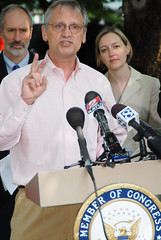
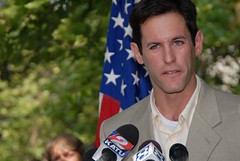

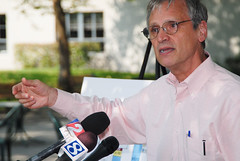

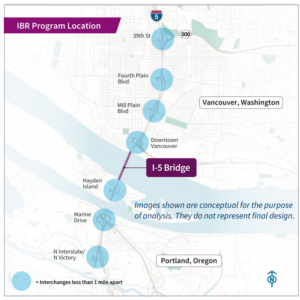
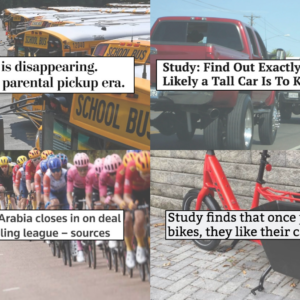
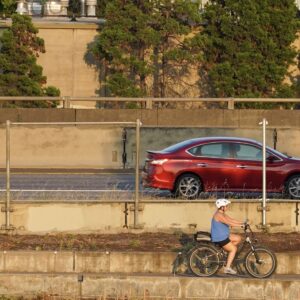
Thanks for reading.
BikePortland has served this community with independent community journalism since 2005. We rely on subscriptions from readers like you to survive. Your financial support is vital in keeping this valuable resource alive and well.
Please subscribe today to strengthen and expand our work.
I love this guy. I really hope he plays some part in Obama\’s presidency. Go Blumenauer!
So,
The real question is if this is going to affect the citizen who is not just switching to alternative transportation, but is already and has been using it.
I realize you mention instead of just commuters who work for the right companies, this will reach out to the self employed as well.
While that is great, it still appears to leave out (hopefully I am wrong here) the highest number of commuters/cyclists, those who work normal jobs, for normal employer\’s, who do not, and probably will not, go through the steps necessary to provide a tax credit for their workers.
So, is this tax credit going to be offered to ALL cyclists who commute/shop/live by bike, instead of using precious fossil fuels?
Anyone? Anyone? Bueller? Bueller?
On the surface his proposal seems so common-sense and practical (promoting alt transportation, tax fixes, NOT pushing oil drilling) that it\’s doomed to failure.
How about those who choose to walk to work?
Where\’s our tax credit?
My current commute is 5 minutes.
To get the tax credit I would have to ride my bike and that would double my commute time by making me get the bike out of the garage on one end of the trip and having to get it stored in the bike room at the other end of the trip.
Seems by walking my carbon footprint is even less than that of someone commuting by bike.
Come on Earl, show us pedestrian commuters some love.
How about those of us choosing NOT to work?? 😉
Rodney…did you even read the legislation? Walking is specifically mentioned numerous times.
from what I heard, it also seems reasonable to me. I\’d like to learn about the details. What are the overall effects? How will this effect small businesses? Who opposes it and why? Those are the things I am curious about.
The more I hear and read about this, the more it appears it is just another tax break for a limited few.
Not as good as it sounds at all.
so earl wants us all to live along light-rail, live in each others backyards and walk and ride bikes in oregon in january,so we can get small tax credits. what thay failed to mention is that the suv tax breaks are small and for business not the ordinary joe. got nothing against bikes just some riders and congressmen looking for votes while not telling the truth.
I appreciate the sentiments behind this but doubt that much of it will work in reality. For example, if home buyers get an \”income boost\” to qualify for homes close to transit routes then those homes will become very desirable and that will mean higher prices. Sellers will gouge knowing that they can and will benefit from location and those prices will put homes outside the reach of those who need them most. (South Waterfront condos just got $100,000 more expensive because of the streetcar but median income Portland family\’s new \”income\” credit still doesn\’t qualify them for the mortgage.)
Tax credit for bike commuters? Define \”bike commuter\”? Drive to within a mile of downtown, take the folder out and complete the trip – does that count? You work in the \’burbs and have 500 parking spaces in your office park and you ride a bike to work only during BTA Commuter Challenge or national Ride to Work Day – take the full credit? Heck, just lie about it! Like the IRS is going to show up at your office or home looking for a bike.
I also have reservations about credits for developers building transit / alternative transport properties. While a great idea in theory, I fear that more Pearl Districts will get built filled with wealthy boomers paying top dollar for condos and still going places in their cars. (Hybrids perhaps but still cars – how many 50+ riders have you seen in The Pearl?)
If this can be tightened down with specific rules and income limits for some of the tax and housing benefits, then it could be very worthwhile legislation.
I\’d like to see Blumenauer call for a quarter increase in the gas tax.
Hi:
According to the BTS – Americans drive about 730 Billion miles a year. (I accounted for some growth)
http://www.bts.gov/publications/transportation_statistics_annual_report/2001/html/chapter_08_figure_03_233_table.html
At an average fleet economy of, say, 20 mpg:
http://www.bts.gov/publications/national_transportation_statistics/2003/html/table_04_23.html
that\’s about 36.5 Billion gallons of gas used per year,
Which is then multiplied by an EXTRA $0.25 per gallon increase in the gas TAX
which equals additional revenue of over $9 Billion per YEAR.
America collected about $28 Billion in federal gas tax revenue in 2006, so an extra $9 Billion+ is significant lettuce.
Oh, and…
It would have a total YEARLY average cost, for Every Child, Woman and Man in America, of.
$30. Thirty Dollars. Thirty Dollars.
The tax should be imposed ASAP. Revenues should be distributed to the States as the system currently does (or maybe based on population, or percentage of the total VMT driven in each state, e.g.)
States should then be allowed to spend the money on their transportation system HOWEVER THEY CHOOSE. Including on pedestrian and bicycle infrastructure.
Maybe not transit/rail because America, in partnership with the Big Nine: http://en.wikipedia.org/wiki/Class_I_railroad should build out the rail system (passenger & freight, urban, commuter and long haul) the way the US Highway System was built out in the 50s, 60s, etc.)
I like Earl, but until he wants to propose something simple, straightforward, and proven to be effective (that\’s the gas tax), then PERSUADE Representatives in Congress to pass the increase (!!), well,
Call me not impressed with his leadership on Transportation.
I\’d like to see someone in Congress call for a DOLLAR increase in the gas tax.
And then I\’d like to see someone seriously talk about CONTROLLING growth rather than \”managing\” or \”accommodating\” it. When our population doubles, so does our resource use. When our economy doubles, so does our resource use. We\’re in unsustainable territory as it is, either we need massive gains in efficiency with no additional gain in standard of living, (Jevons\’ Paradox practically ensures that won\’t happen) or we need to halt economic growth.
If we don\’t do it voluntarily, natural systemic proceses will do it for us.
I applaud the intent, but we need to go much further, much faster. The longer we wait and the less we do, the more that forces beyond our control will make our decisions for us.
Even better, change the gas tax from a per-gallon rate to a per-dollar rate. Then, every time the price goes up, more revenue is generated, instead of less.
I was going to put a dollar, but I opted not to in favor of an approach that I think is realistic and sellable, albeit a baby step. Let\’s get the first quarter passed (we can always add on more for Oregon if we want) and then start talking about the next quarter.
Picio, I like how lucid you are about it. People don\’t like to hear \”stop economic growth\” but that is what does have to happen unless, as you say we move our political processess MUCH faster to balance it all out.
What thoughts do you have about how to move through the political climate faster in regards to what Blumenauer and the BTA are doing? What about land speculators gentrifying instead of accommodating local populations?
When you start talking about using policy to control or stop economic growth, the conversation becomes one of fantasy, not politics. I say that with all due sympathy for the sentiment, but political reality ensures that the necessary changes will not happen quickly. Whether they will happen quickly enough to forestall the effects of the \”natural systemic forces\” is doubtful, but that\’s the way it works. There will simply have to be massive economic disruption before the current power structure willingly acts to curb its own profit, and if there is such disruption, it won\’t matter anyway.
Campaigning for Secretary of Transportation looks like a hard job. He should stay a little more under the radar though, or he\’ll give the Republicans a bigger target to show rural, downscale, Pentecostal, and even possibly some low-information voters what kind of \”radicals\” Obama would have running the government.
At least he ditched the bowties before some e-mail campaign to low info voters started making the rounds about Blumenauer / Farrakhan – Cut From The Same Cloth.
Brad,
Good point.
However, his persona which reeks of effete metropolitanism does worse than link him with Farrakhan, bow tie or no.
#12
Maybe the average cost of a $.25/gallon tax would be $30 per person-in-the-US (some of whom would not be paying it), but the cost to an average 12k mi./yr. driver would be more like 12000mi/yr / 20mi/gal * $.25/gal = $150/yr.
Not saying anything about whether that would be good or bad, just that it is a more realistic representation of what would have to come out of an individual\’s pocket.
Although well intentioned, I think a Bike commuting tax break is the wrong approach. Ask your self these questions:
1. How will you prove you are bike commuting? Logs, Check-in stations, receipts. Do you really want to check in with the man.
2. Income taxes are at their core, regressive. You have to make enough money to even have a tax deduction, so this only helps the middle class and up.
If anything, the structure as it is set up already subsidizes bike commuting. The drivers pay gasoline tax which is used for infrastructure for cars and bikes alike. Bikes pay $0.00 per mile so riders are already getting a tax break.
Blumie should focus on increasing the % of the gas tax that gets attributed to bike and alternative transit. If you really want to discourage driving, make the gas tax a % of cost (like a sales tax) vs. a per gallon tax. The more expensive the gallon cost the more tax is collected. Market forces self correct the system.
Cheers,
Brad
The scenario you describe about homes near mass transit is already a reality. Only its the income hit and not boost from any tax credit that is driving this trend.
A recent survey of real estate agents found that 78% of their buyer clients want to live in the city, which presumably has better access to mass transit than the burbs.
http://www.cnn.com/2008/LIVING/wayoflife/06/20/gas.realestate.ap/
Zach-
Be realistic. 25 cents, a dollar, that\’s probably not going to help Earl in his efforts to get people thinking towards more transportation funding. Even in Portland, are we ready to swallow that pill? He\’s doing what he can given the circumstances.
Is there anyone\’s leadership you\’re impressed with?
Gas tax won\’t fly. I don\’t get it, myself, but it just won\’t. Last proposal in Oregon went down 80/20 … and that was at much lower prices. If it\’s the same nationally, and I can\’t believe it\’s going to be any better with $4+ gas, no sensible politician\’s going to be anywhere near such a proposal. Heck, Clinton and McCain read the tea leaves and proposed going the other way … the holiday from the current gas tax.
But maybe we don\’t really need it…. Maybe all that\’s needed is to keep prices at or above current levels.
There\’s lots of good stuff happening with $4+ gas … people exploring alternative fuels/energy, people using alternative modes. Maybe keeping that going is a good first step forward, and maybe less politically fraught…
Proposals to put a floor under oil prices coupled with a gas tax has been out there for awhile. (Usually there\’s some use of part of the gas tax to reduce payroll tax to offset the cost for the non-rich who pay the thing.) Difference now is that prices have gone up so much that maybe the tax part isn\’t needed to induce further behavioral change. Just the floor part that acts as an insurance policy against market price drops that cause us to back off on our recent good behavior.
I do worry that we get a response that adds supply and ultimately causes prices to drop … like they did post 70s. (Some analysts predicting $200/barrel oil near term go on to say it\’ll be $70-$80 in the medium term, but we don\’t hear much on that). Back in the 70\’s it was producers turning up the spigot that led the price to drop. Even if you don\’t buy that they can do that now, lots of coal and tar sands conversions and ? are profitable at lower prices than we see today. All those other forms of nice carbony stuff that causes problems might just drive down the price and reduce the pressure to move in a better direction.
Why not establish a floor for insurance against that? I wonder if our reps in Washington could go that far?
Thoughts?
Peter:
I’m really sorry to hear that you think a 25 cent increase in the federal gas tax is unrealistic. Personally, I expect a lot from my leaders, and Blumenauer is coming up waaay short on his latest proposal. Which, as I read the summary, sounds a lot to me like, frankly, a bunch of Washington-style bullshit.
I don’t know how to say in it fewer words: we need more money to pay for our infrastructure. Now. The gas tax has very low administrative costs, and a quarter increase would be very significant. The total cost (as #21 pointed out) to a driver of 12K miles per year (at 20mpg) would be $150. Which is absolutely peanuts. Americans waste so much money on consumerist garbage that they could easily save themselves about 50 cents per day to cover the increased cost. Everyone could do it, and should see it as an example of national SACRIFICE, even though apparently that is a dirty word these days, along with SERVICE, and FRUGALITY. Apparently we are all too busy drinking Stumptown while America burns.
I want Earl to stand up and tell the whole truth, plainly and openly. He won’t, because like most politicians, he is always looking to the next election. I don’t want hear excuses and “he’s doing what he can” – would you hire someone that talked like that? I say he’s ineffective and weak. I know I could do a better job than him. And if I can’t, I will happily crash and burn trying and pushing as hard as I can, but I will certainly be HEARD.
And where is Salem? Finding money for basketball arenas. They said we couldn’t afford a gas tax increase of a dime when gas was a buck fifty. And now we are paying triple.
I understand I am not going to get any points for diplomacy and I am sure as hell not making friends here. But I am not interested in pulling punches. I am interested in solving problems. I am interested in telling whoever will listen that we are in the middle of a serious crisis in this country, and it is going to take people who will drop the BS pretension, roll up their sleeves and get it done. Where is the dedication to the common good? Where is the sacrifice for a better world? I will bust my ass to make it happen.
I was impressed with Sam Adams’ Safe Sound and Green Streets idea, especially because he proposed it during a year where he was going to have a tough election fight. That took guts.
I’d like every transportation professional in Portland and Oregon to march on Salem this coming session and demand we raise our gas tax. Who’s with me? I’m inviting all to bicycle down to Salem together after breakfast at my house.
Cantseemuch:
Charles Krauthammer has been proposing a gasoline price floor for 25 years according to his recent article on the subject. And I don\’t disagree with you or him on that.
But right now we need more money, and a serious national plan for transportation. There isn\’t anyway around that. $4 gas is making a difference, but we need so so much more.
\”Politically fraught\”? You are right on. And we need politicians who are not afraid of doing and saying the right things, even if they are politically fraught. That is what they are supposed to do. If they are unwilling to do so – they need to go find a job where that is not a requirement.
You are right to worry about prices going down. And that is why we need to seize the moment. This latest proposal, in my opinion, doesn\’t even come close to that. But man, it sure is politically un-fraught.
Zachary …
I\’m in your camp. I think it would have been useful to add a buck or two to a gallon of gas a year ago… use some of the proceeds to offset the impacts on low income gas users and the rest for infrastructure. But the thing is, it wasn\’t and isn\’t politically possible. Not a chance in hades. Note the ratio or Oregonians for and against adding to the state gas tax when it didn\’t cost much. And look who\’s been leaning the other way toward a \”gas tax holiday.\” No WAY will additional gas tax fly … expecially under current conditions.
Not to get all holy, but it doesn\’t seem like a whole lot of a reach to think that if we had the gas prices of today a couple of years ago and people started doing all the good stuff they\’re doing now back then … re: chaining trips, using alternate modes, exploring and developing alternate energy … there might just have been enough pressure removed from demand for that marginal barrel that prices wouldn\’t have gone up nearly so much. What\’s better, the additional $ could have gone to us to do stuff with (i.e., rebate other taxes or build, maintain transportation systems) instead of building another skyscraper in Dubai or Riyadh or providing the capital that the oil folk turn around and use to buy into our poor little banks.
I AM with you in spirit, but I just cant believe you\’ll get anywhere close to the necessary support for any kind of gas tax hike right now.
But how about this story: \”We need additional $ for infrastructure, but times are tough so we won\’t suggest adding to your burden right now. Yes, we\’ll just kick that can down the road. But look at all the good stuff that\’s going on because of these prices. We\’re really moving a good direction. How bout we just put a floor under current oil prices. We won\’t tax anything unless prices drop from here. And if they do, we\’ll tax the difference and put the proceeds toward reducing the payroll tax or, if you agree, toward maintaining our transportation systems at a higher level. Really, it won\’t cost more than it does now. Come on … Come on… We can do this!\”
Seems to me something along those lines is more achievable than asking people to add to a burden that\’s already increased so much recently.
In truth, I think a floor alone would be tough to get. Costs have just gone up too fast for anyone to seriously suggest anything other than we\’ve got to make them go down again.
Really, I don\’t blame folk. We\’re getting whipsawed. We have a hard time with reasoned logical approaches to policy making designed to protect and support ourselves because we don\’t trust ourselves to get it right. We\’d just as soon continue to suffer the bruising that comes with letting the market do its thing.
And we do spend a lot of money on a lot of stuff that\’s weird to one large chunk of us or another, so why should we just add to the problem. Heck, if we add to the gas tax we might end up with the Alaskan bridge to nowhere afterall. Just think what could we do with the $12 billion a month that\’s going to Iraq?
Rant done.
This bill got introduced on the House floor yesterday, and referred to Committee. Proposes a $50 a month tax free allowance, vs. $20 in the previous attempt that made it to the Senate.
More details — http://city-bikes.blogspot.com/2008/07/bike-transportation-fringe-benefit.html